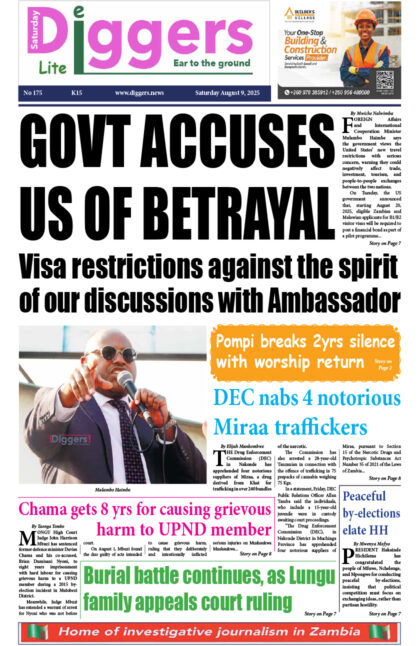Transparency International Zambia (TIZ) president Rueben Lifuka has challenged President Edgar Lungu constitute a task force on corruption in order to strictly fight the scourge.
And Lifuka says the oath of secrecy was not put in place to coverup criminality among government officials.
Speaking in an interview with News Diggers, Lifuka urged President Lungu to constitute an anti-corruption task force if he was serious about winning the fight against graft.
“Look at the public procurement. What the President has to do is to put up a team, remember he did put together a team on infrastructure. Why doesn’t he put together a task force, an anti-corruption task force to include ministers, government officials and some stakeholders to say ‘what do we do’ and ‘how do we fight this scourge of corruption?’ so we need leadership and leadership can only be exercised at the highest level and in this particular case the president has that privilege to exercise leadership,” Lifika said.
“Yes we are not going to leave it to him alone. Even the private sector has a role to play; remember most of the supply comes from the private sector. And we are calling upon the private sector not to be aloof in this whole fight. In this country, we have not seen active involvement of the private sector on the fight against corruption. We want to see practical action to rid this country of corruption.”
He said President Lungu should act on his 2018 declaration as a year against corruption.
“Mind you, this year and this is critical, President Lungu and other heads of states went to the African Union and declared 2018 as a year against corruption. I mean we cannot just live with that declaration, we need to see practical action. What does it mean for 2018? It must be the year against corruption. And that’s a clarion call to government, as cabinet sits, they should demonstrate and pledge to the Zambian people, ‘as the year against corruption, this is what we are going to do.’ then in the review, we will say it was a worth while,” Lifuka said.
The transparency advocate said in the absence of corruption, Zambia could attract more investment.
“I think that Zambia can attract even more investment than we are currently doing other than just for economic reasons but for social political reasons such as the state of corruption in this country. Remember investors do not just throw money in the country. They do their due diligence and in a country where corruption is rampant, that is a potential cost to business,” Lifuka explained.
“It means that competition is not there. If an international investor comes to the country hoping that they can make returns on their investment and they are not able to do that because of all the under hand dealings that is a loss to their own investment. So we need to understand that fighting corruption is an important element in attracting and returning investment for a country that wants to develop . And we are relying on foreign direct investment.
Meanwhile, Lifuka said there was need for a comprehensive reform on the official oath of secrecy law in order to clear existing contradictions and overlaps.
“I think the oath of secrecy for any government official, particularly the ministers need to understand that its a very strong oath that they undertake. Its one that they should abide by. Why you do that is because there are several things that cabinet discuss including security related matters and you don’t want a former serving government official to go out there immediately after leaving office to start talking about some of these issues,” said Lifuka.
“However, the oath should not really be around criminality that happens in government. This is where we need to review our own laws. Do we have laws that can easily be used to shield criminality. If as a former government officials I noticed that there is criminality happening in Zambia, are you saying am bound by that oath to say nothing or I am duty bound in fact to go out and say I think there is criminality? And what does it mean to be a whistle blower? Because you can also have a cabinet minister who is a whistle blower. So we need to balance these things and that is why we are saying we need a comprehensive reform, one that looks at all these laws and see things where there are overlaps and contradictions.”























